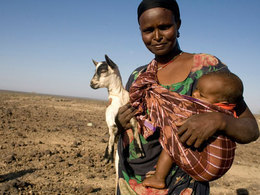Archbishop hosts round table on Horn of Africa crisis
 Photo: FAO/Giulio Napolitano
Photo: FAO/Giulio NapolitanoMonday 24th October 2011
The Archbishop of Canterbury, Dr Rowan Williams, hosted a round table on the Horn of Africa food crisis.The meeting had been drawn together by the Anglican Alliance, a recently-launched initiative for building capacity in the Anglican Communion on development, relief and advocacy.
The round table included representatives from the Department for International Development and the Foreign Office, international and faith-based NGOs, the Anglican Church in Africa and the Muslim community in Britain, the UK Parliament and the media, and sought to find fresh perspectives and responses to the situation in the Horn of Africa.
The Archbishop observed that food security and famine crises were not simply natural disasters but arose within a hugely complex cultural, political and economic context and as such they could not be tackled in isolation. A major factor in the current crisis was the need for a regional response in aiding pastoralist communities. Another issue that emerged was the state of small-hold farmers, who are currently threatened by large-scale agribusiness and a lack of government support. This model of small-scale farming holds the most hope for sustainable food supplies and economic stability, and the Archbishop said that faith-based groups had a major role to play in making this a priority for governments:
"It is an area where faith communities can deliver, not least in the way that we are increasingly aware of the pivotal role of women in the delivery of grassroots agricultural improvement. Many of us will have seen that in all kinds of contexts. Faith communities together can make a solid and coherent point about small-hold farmers, about the role of women, about steady incremental education and development."
In his concluding remarks, the Archbishop made suggestions on:
- an effective inter faith coalition to create a platform for small-holder farming and the role of women in agriculture;
- inter faith groups monitoring enterprises such as arms traffic and the extractive industries, with advocacy and public awareness programmes;
- government cooperation in the region to set up effective ways of helping pastoralist communities;
- sustained international action in disaster risk management, with sufficient funds for an early response.
The Anglican Alliance will work with partners to take the initiative forward.
